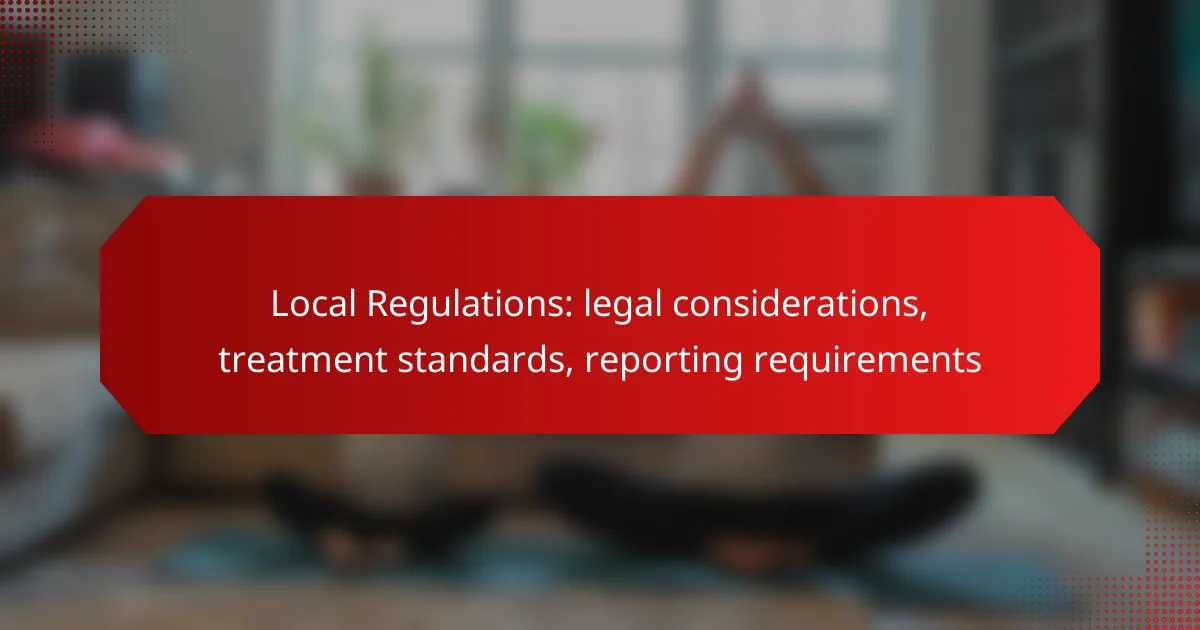Local regulations in the UK involve a complex framework of legal considerations, treatment standards, and reporting requirements that are essential for businesses and individuals to understand. Compliance with laws such as the Health and Safety at Work Act 1974 and the Data Protection Act 2018 is crucial for maintaining operational integrity and avoiding legal pitfalls. Additionally, treatment standards in healthcare ensure that patient care and safety protocols are upheld, reflecting the importance of quality in service delivery.

What are the local regulations in the UK?
In the UK, local regulations encompass various legal considerations, treatment standards, and reporting requirements that businesses and individuals must adhere to. Key regulations include the Health and Safety at Work Act 1974, the Environmental Protection Act 1990, and the Data Protection Act 2018, each addressing specific areas of compliance and responsibility.
Health and Safety at Work Act 1974
The Health and Safety at Work Act 1974 mandates that employers ensure the health, safety, and welfare of their employees and others affected by their work activities. This includes conducting risk assessments, implementing safety measures, and providing appropriate training and information to staff.
Employers must also maintain records of health and safety policies and procedures, and regularly review them to ensure compliance. Failing to meet these obligations can lead to significant penalties, including fines and legal action.
Environmental Protection Act 1990
The Environmental Protection Act 1990 establishes a framework for managing waste and protecting the environment in the UK. It requires businesses to handle waste responsibly, ensuring proper disposal and minimizing environmental impact.
Organizations must obtain necessary permits for waste management activities and adhere to regulations regarding hazardous waste. Regular reporting on waste management practices is also required to demonstrate compliance with environmental standards.
Data Protection Act 2018
The Data Protection Act 2018 governs how personal data is collected, processed, and stored in the UK. It aligns with the EU’s General Data Protection Regulation (GDPR) and emphasizes individuals’ rights over their personal information.
Businesses must implement measures to protect personal data, including obtaining consent for data processing and ensuring transparency in how data is used. Non-compliance can result in hefty fines, making it crucial for organizations to stay informed about their data protection obligations.

What legal considerations should businesses in the UK be aware of?
Businesses in the UK must navigate various legal considerations, including data protection, employment laws, and consumer rights. Understanding these regulations is crucial for compliance and to avoid potential legal issues.
Compliance with GDPR
GDPR, or the General Data Protection Regulation, mandates that businesses protect the personal data of EU citizens. Companies must ensure they have a lawful basis for processing data, provide transparency about data usage, and implement appropriate security measures.
To comply, businesses should conduct regular data audits, maintain clear records of data processing activities, and establish protocols for data breaches. Failure to comply can result in hefty fines, often reaching millions of pounds.
Employment law obligations
UK employment law encompasses various regulations that protect employee rights, including minimum wage, working hours, and anti-discrimination policies. Employers must ensure they adhere to these laws to foster a fair and safe workplace.
Key obligations include providing written contracts, adhering to statutory sick pay regulations, and following proper procedures for dismissals. Regular training and updates on employment law changes can help businesses stay compliant and avoid legal disputes.
Consumer Rights Act 2015
The Consumer Rights Act 2015 outlines the rights of consumers when purchasing goods and services in the UK. It ensures that products must be of satisfactory quality, fit for purpose, and as described.
Businesses must be prepared to address customer complaints and provide refunds or replacements when necessary. Understanding these rights can help businesses build trust and enhance customer satisfaction, ultimately leading to repeat business.

What are the treatment standards required by UK law?
In the UK, treatment standards are governed by various regulations and guidelines that ensure the safety and quality of healthcare services. These standards focus on patient care, safety protocols, and the overall effectiveness of treatment provided by healthcare professionals.
Care Quality Commission standards
The Care Quality Commission (CQC) sets essential standards for healthcare providers in England, ensuring that services are safe, effective, caring, responsive, and well-led. Providers must meet these standards to be registered and operate legally.
Key areas assessed by the CQC include patient safety measures, staff training, and the quality of care provided. Regular inspections and ratings help maintain accountability and encourage continuous improvement among healthcare services.
National Institute for Health and Care Excellence guidelines
The National Institute for Health and Care Excellence (NICE) develops evidence-based guidelines that outline best practices for treatment across various health conditions. These guidelines help healthcare professionals make informed decisions about patient care and treatment options.
NICE guidelines cover a wide range of topics, including medication management, diagnostic procedures, and patient follow-up care. Adhering to these guidelines is crucial for ensuring that patients receive high-quality, effective treatment that aligns with the latest clinical evidence.

What are the reporting requirements for businesses in the UK?
Businesses in the UK must adhere to various reporting requirements that ensure compliance with legal and regulatory standards. Key areas include annual company accounts, health and safety incident reporting, and environmental impact assessments.
Annual Company Accounts
Annual company accounts are mandatory for most businesses in the UK and must be filed with Companies House. These accounts typically include a balance sheet, profit and loss statement, and notes on financial performance.
Companies must prepare their accounts in accordance with UK Generally Accepted Accounting Principles (GAAP) or International Financial Reporting Standards (IFRS), depending on their size and type. Small companies may benefit from simplified reporting requirements.
Health and Safety Incident Reporting
Under the Reporting of Injuries, Diseases and Dangerous Occurrences Regulations (RIDDOR), businesses must report specific workplace incidents to the Health and Safety Executive (HSE). This includes fatalities, serious injuries, and certain occupational diseases.
Reports must be submitted within a specific timeframe, typically within 10 days for injuries and immediately for fatalities. Failure to report can result in significant penalties, so maintaining accurate records is crucial.
Environmental Impact Assessments
Environmental Impact Assessments (EIAs) are required for certain projects that may significantly affect the environment. Businesses must assess potential impacts on local ecosystems, air and water quality, and community health.
The EIA process involves public consultation and submission of a detailed report to the relevant local authority. Companies should ensure compliance with the Environmental Impact Assessment Regulations to avoid delays and legal issues.

How do local regulations affect business operations in the UK?
Local regulations in the UK significantly influence business operations by dictating compliance standards, operational costs, and reporting obligations. Understanding these regulations is essential for maintaining legal compliance and optimizing business practices.
Impact on operational costs
Local regulations can lead to increased operational costs for businesses in the UK. Compliance with health and safety standards, environmental regulations, and employment laws often requires investment in training, equipment, and processes. For example, businesses may need to allocate a portion of their budget for regular safety audits or environmental assessments.
Additionally, failure to comply with regulations can result in fines or penalties, further impacting financial resources. Companies should conduct regular reviews of their operational practices to ensure they meet local standards, potentially avoiding costly mistakes.
Influence on business practices
Local regulations shape business practices by establishing guidelines for ethical conduct, employee treatment, and customer interactions. For instance, data protection laws, such as the UK General Data Protection Regulation (GDPR), require businesses to implement strict data handling procedures, influencing how they manage customer information.
Moreover, regulations can drive companies to adopt sustainable practices, such as reducing waste or sourcing materials responsibly. By aligning business operations with local regulations, companies not only comply with the law but can also enhance their reputation and customer trust.

What frameworks exist for understanding local regulations?
Understanding local regulations involves frameworks that help navigate legal considerations, treatment standards, and reporting requirements. These frameworks provide structured approaches to ensure compliance and manage risks effectively.
Regulatory Compliance Framework
A Regulatory Compliance Framework outlines the processes and standards necessary to adhere to local laws and regulations. This includes identifying applicable regulations, implementing necessary policies, and conducting regular audits to ensure adherence.
Key steps in this framework include mapping out relevant regulations, training employees on compliance requirements, and establishing reporting mechanisms. For example, businesses in the EU must comply with GDPR, which mandates specific data protection measures.
Risk Management Framework
The Risk Management Framework focuses on identifying, assessing, and mitigating risks associated with non-compliance. This framework helps organizations prioritize risks based on their potential impact and likelihood, enabling informed decision-making.
Effective risk management includes regular risk assessments, developing contingency plans, and engaging stakeholders in the process. Organizations should consider local factors, such as industry-specific risks or community expectations, to tailor their approach. For instance, healthcare providers must comply with local health regulations to minimize legal risks and ensure patient safety.

What are the emerging trends in local regulations in the UK?
Emerging trends in local regulations in the UK reflect a growing emphasis on sustainability, transparency, and community engagement. These trends are shaping how businesses operate and how local authorities enforce compliance with legal standards.
Increased focus on sustainability
Local regulations in the UK are increasingly prioritizing sustainability, requiring businesses to adopt eco-friendly practices. This includes stricter guidelines on waste management, energy efficiency, and carbon emissions. Companies may need to implement measures such as reducing plastic usage or enhancing recycling efforts to comply with these evolving standards.
For example, local councils may introduce incentives for businesses that invest in renewable energy sources or green technologies. This shift not only helps the environment but can also enhance a company’s reputation and appeal to environmentally conscious consumers.
To navigate these changes effectively, businesses should stay informed about local sustainability initiatives and consider conducting regular audits of their environmental impact. Engaging with local authorities early on can help identify compliance requirements and potential support for sustainable practices.
